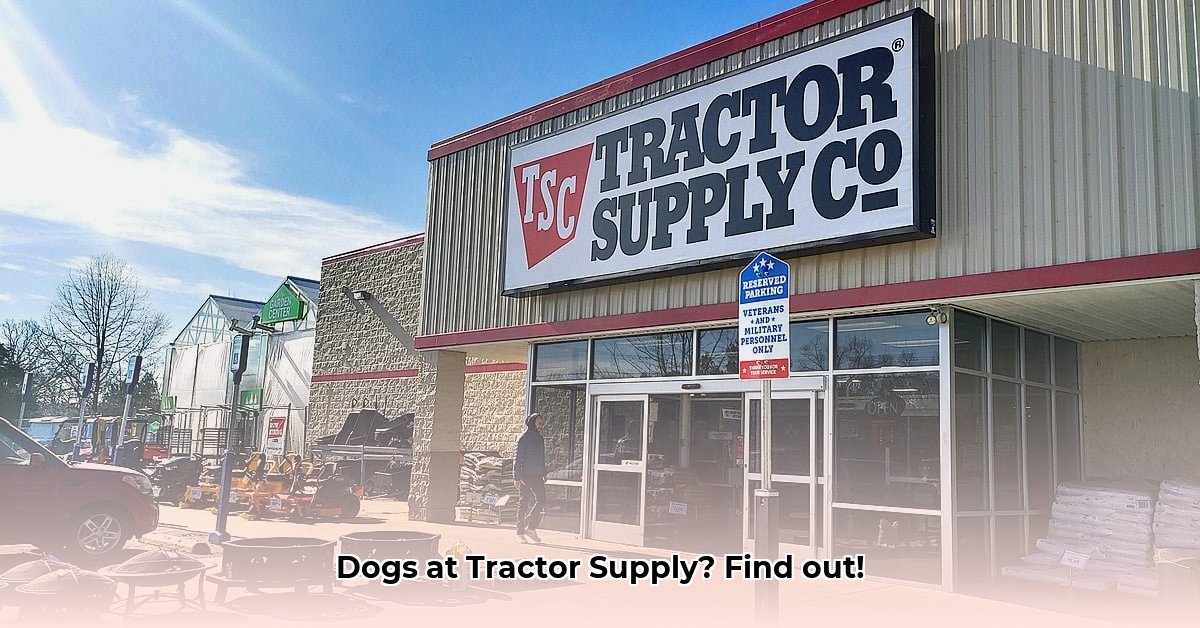
Tractor Supply's policy on dogs in its stores is a frequently asked question, and the answer isn't always clear-cut. This guide examines the current situation, exploring the unofficial practices and outlining steps toward a more comprehensive and consistent policy. We will also delve into the potential return on investment (ROI) of a formal pet-friendly policy. For more on pet products available, check out this helpful resource.
Tractor Supply's Dog Policy: The Unwritten Rules
Many Tractor Supply stores unofficially welcome dogs, creating a welcoming atmosphere for pet owners. This has fostered customer loyalty among pet owners. However, the lack of an explicit written policy creates inconsistencies across locations. Some stores may be more welcoming to dogs than others, leading to confusion and potentially problematic situations. This presents challenges for both customers and the store itself. Isn't a clear policy beneficial for everyone involved?
Inconsistencies and Potential Problems
The absence of a formal policy results in varying levels of dog acceptance across different Tractor Supply stores. Some locations may freely permit dogs, while others may impose restrictions on size or leash requirements. This inconsistency creates potential issues, however. For instance, a dog's behavior (barking, accidents) can be difficult to manage without clear guidelines in place. Furthermore, the lack of a formal policy complicates liability issues for the company in case of incidents involving dogs.
Weighing the Pros and Cons
The unofficial dog-friendly environment at Tractor Supply offers several advantages. For many locations, it fosters a welcoming atmosphere and enhances customer loyalty among pet owners. But, this casual approach also poses risks. Accidents can occur regardless of a dog's temperament, and managing multiple dogs in a retail setting demands careful consideration. Does this inform the decision about the need for a clearer policy?
Towards a Clearer Policy: Steps for Improvement
Implementing a consistent, company-wide policy regarding dogs would benefit everyone involved. This would not only resolve confusion and improve safety but would also provide clarity for customers, employees, and the company:
- Tractor Supply Corporate: Develop a formal, written policy clearly defining dog allowances, specifying size limits, outlining leash requirements and expected behavior, and establishing procedures for handling incidents. This should be readily accessible both online and in-store.
- Store Managers: Receive comprehensive training on the fair and consistent enforcement of the new policy. Managers should know how to handle situations involving misbehaving dogs and be equipped to address customer concerns. Effective communication is paramount.
- Pet Owners: Always maintain control of their dogs using a leash and promptly clean up after any accidents. Considerate behavior towards other shoppers is crucial.
- Animal Welfare Groups: Collaborate with Tractor Supply to craft a policy that promotes responsible pet ownership and provides guidance on safely managing dogs in retail environments.
Measuring the ROI of a Pet-Friendly Policy
Tractor Supply's potential for improved ROI hinges on a clear understanding of how a pet-friendly policy affects its bottom line. It's not simply about allowing dogs; it's about measuring its financial impact.
Key Metrics for Assessment
To accurately assess the impact, key metrics must be tracked:
- Foot Traffic: Monitor the number of visitors both with and without dogs to determine increased traffic due to the pet-friendly policy.
- Sales Lift: Analyze sales data correlated to pet visits to ascertain if pet-related items or overall sales increase as a result.
- Customer Feedback: Gather insights from online reviews, surveys and direct interactions to gauge customer satisfaction levels. Happy customers are more likely to return.
- Social Media Engagement: Track social media mentions, hashtags, and shares to gauge the public perception of the pet-friendly policy. Is there a positive buzz?
Long-Term Considerations
The ROI calculation extends beyond short-term gains. A positive reputation as a pet-friendly business fosters brand loyalty. Positive word-of-mouth and online reviews attract future customers. However, effective management of potential negative incidents (accidents, etc.) also significantly impacts your broader brand reputation. How do you think this impacts the long-term strategy?
Data Analysis and Interpretation
Thorough analysis is essential to interpret collected data:
- Correlation vs. Causation: Careful analysis is necessary to discern whether increased foot traffic directly caused increased sales or if other factors are at play.
- Attribution: Precisely determining the extent to which sales increases are due to the pet policy is crucial.
- Customer Segmentation: Identifying which customer groups (e.g., pet owners with children) respond more favorably is important for targeted marketing.
Advanced analytics such as regression analysis can be valuable tools in this process. The goal is to make informed decisions which benefit the business.
Conclusion: A Holistic Approach
Measuring the ROI of a pet-friendly policy demands a comprehensive approach. It involves understanding how this decision impacts customer behavior, brand reputation, and long-term profitability. A strategic combination of data collection and insightful analysis is key to optimizing a pet-friendly policy and maximizing its value.